Even Asda doesn't have the benefit of hindsight. Why else would CEO Andy Bond have put on an England rugby shirt, at a conference of his 350 store managers, to talk about the basics of teamwork - three days before England got mullered by South Africa in the World Cup by 32 points to nil.
But rewriting branding history is another matter. Two years on from his infamous 'where's the flair?' speech at an IGD conference, Asda's CEO watches on as food trading director Darren Blackhurst explains to the store managers the supermarket's plans to put Britain's brands to the test.
"We are challenging whether certain
brands have brand equity. We took Princes out. The tuna don't swim past and say 'bugger me, I don't want to go in that can, I want to go in this one'. So we said we'll go with one can or the other, and chose John West. And have we had a single complaint from customers? Not one. Why? Because it wasn't a brand.
"We did the same with Utterly Butterly and I Can't Believe It's Not Butter. It's just margarine. I can't even remember which one stayed in, to be honest. And again, not a single complaint."
Isn't this the same old Asda, I ask, beating up its suppliers again? Bond insists not. Blackhurst is carrying out a challenge Bond had set for Britain's food and drink manufacturers following that speech: "To start a revolution," as he put it, "and create a point of difference."
This isn't just a question of picking sides, although Blackhurst boasts that he did get a "damned good price" from John West for exclusivity.
More than this, he says, it is a genuine attempt by Asda to establish the validity of a brand, to eradicate unnecessary duplication, eliminate what Bond called "more varieties of sameness" and make room for "genuine excitement and customer satisfaction".
"People think they're being innovative when they bring out a variation on an old theme - a new type of Kit Kat, for instance," Bond had argued. Now it's time to test that out. Proving that it's genuine, Blackhurst concedes that just as this has involved successful trial, so it has established error. "We tried it with McVitie's Homewheat. That's a brand," he admits to the audience. "We're bringing that back. And we delisted Baxters Soup in Scotland. Big mistake. That's most definitely a brand. That's also back."
If Asda breaks a few shells in the process, Blackhurst sees that as proof that Asda is trying to build a tastier omelette. "And anyway," he adds, matter-of-factly, "they're our shops. We can do what we want."
Spending the day shadowing Bond and his senior execs, it is clear why Asda is regarded as such a challenging customer to have. But it's equally apparent just how much has changed since Bond took the helm, two-and-a-half years ago, at the Wal-Mart-owned multiple.
The latest iteration of this is the Organics range. Asda now sells more than 850 organic products, across fresh, frozen and ambient categories, with plans to extend this to more than 1,000 by Christmas. The range was relaunched with new PoS material last week to coincide with Organic Fortnight. And its commitment to this programme is further demonstrated by the length of the promotion - across a minimum of four weeks - and the nature of the offer, with 300 price rollbacks designed to make organic an integral part of the Asda offer.
"These rollbacks open up a new consumer for organics," explains Bond, as we tour a supermarket where he is checking the implementation.
"The premiums charged by our competitors are unnecessarily high. Being a value retailer, we see it as our responsibility to make organic accessible rather than margin-enhancing. That's why organics is now one of our core values. We don't want to make more money but to satisfy customers."
In each of the aisles in the Leeds supermarket we visit, organic produce is arranged separately. Bond hopes one day to integrate it. But for the moment "we want to show customers that we have choice".
"Organic is like a brand. You're either an organic shopper or you're not. Eventually, it will become so mainstream we'll put it in among regular grocery sections. Thanks to brands like Rachel's and Yeo Valley, organic yoghurt, for example, is getting to a point where it's almost mainstream."
Bond's reference to Rachel's and Yeo Valley is significant. These are examples of the "choice" and "point of difference" that is so central to the vision.
But Asda's commitment to organic is equally startling when you consider the numbers. At the store in Pudsey we are visiting, sales of fresh produce total £135,000 per week. Organic fresh produce sales currently account for just 2.5% of that total, yet this is one of the highest participating areas for organic sales in the store. A side stack for Asda's organic baked beans is equally startling. Is this the same Asda that's renowned for cutting out lines from the bottom up?
"That's old Asda," explains COO Dave Cheesewright. "You wouldn't have seen that a year ago. It's about building a brand. But also offering choice. If we can cut out unnecessary duplication, it gives us more room to offer customers the choice they want."
Organics is the latest in a growing line of changes introduced by Bond and his team since he took the helm in March 2005. And while it's clear change has challenging implications for suppliers, Bond is challenging performance internally, too.
When Bond spoke at the IGD conference, he was openly critical of Asda's performance in own label: the ready meals, he said, hadn't altered in 15 years.
The overhaul of the Extra Special range has been total. Among the team of 200 food technologists and packaging and design experts is Neil Nugent, a Raymond Blanc-trained chef and restaurant owner; and Master of Wine Philippa Carr. In the test kitchen, we sample a lunch of turkey with 'saffron glazing': "the new goose fat", Neil informs us.
A more recent transformation has been the fresh produce section. As well as organics, the range of fruit and veg is almost unrecognisable: sprouted seeds, upmarket mixed salads, custard fruits and plenty of Fairtrade lines. And next on the agenda: improvements to the 'free-from' range for food allergy sufferers.
Asda's more sophisticated approach encompasses not just choice but other factors too, like sustainability. Blackhurst, at the GSM conference, showcases water as an area where duplication can have environmental and cost implications.
"What's the point of trucking over French water, when we've got Buxton's water round the corner. It's water for Christ's sake. We have a responsibility to the environment. And if we can bring in more pallets of less product, we can offer customers a better price."
Asda is also committed to supplying local lines. "Sales of local produce are going from strength to strength, with 15 hubs supplying nearly 5,000 products," Blackhurst claims. And in many cases the local option is outselling national favourites. For example, in Yorkshire stores, sales of Seabrook Crisps are outselling national favourite Walkers. In Newcastle, Doddington Dairy is outstripping Häagen- Dazs. In Cumbria the local sausages are outperforming Wall's.
At the same time, this has given Asda an opportunity to address what it sees as an imbalance, a growing divergence in margin between multinationals and the supermarket chains.
Back at the GSM conference, Blackhurst lays it on the line. "It's criminal," he tells his audience. "The debate is muddied by the plight of the farmers. I'm not going to give money to Nestlé and the like. I wouldn't share a tear for them, no matter how much they bleat. They've been exploiting the public for generations."
Bond is more considered but comes from the same position. "It's not just the level of margin. It's the direction. Operating margins among the supermarkets have been in slow decline over the past 10 years. On the manufacturing side, it's the exact opposite."
Aren't British supermarkets making a greater margin than their European cousins, I ask? "Yes, but the ROI here is no higher than it is in Continental Europe. You have to factor in the higher investment costs. Shareholders wouldn't invest in the UK if there wasn't this level of return."
With greater choice, and local products, now firmly on the menu, this looks like good news, at last, for small and medium-sized companies. Bond believes there should be no distinction.
"I am a great admirer of companies like Innocent and Rachel's. But the guys in the middle only have the right to do business if they can offer a competitive advantage. The large multinationals have better economies of scale to compete on price but we would argue that they're not doing enough to create a point of difference on product. So there is an opportunity there for small and medium-size players who can innovate or offer something different."
The exception is farmers. In recent months, I put it to Bond that Asda has appeared unusually sympathetic to farmers, with ads showing Paul Whitehouse down on the farm.
"No," he counters. "I strongly support farmers. There are no alternatives. So long as they do a good job, I don't want them shafted. I came from Lincolnshire so I understand how important they are.
"Every penny of the retail price increase we introduced this month is going to farmers. But we were supporting dairy farmers long before it was fashionable to do so. For three years now, we identified 650 farmers that we wanted to work with, and paid them a premium for their milk."
What about the £2 chicken? I ask. "Why should I apologise for Asda's £2 chicken?" Bond retorts.
"Our research shows that our shoppers have £146 left at the end of the month to do all their shopping for the month. It's a genuinely shocking number. As a brand that's about value, we think this is the right thing to do.
"We've worked with our suppliers to get a good deal. But this is our investment, and we think our model is sufficiently elastic to make a return on our investment." The evidence from Asda's trading figures suggests this is right.
Nevertheless, with a 34% increase in the price of milk, following the controversial
2-for-£2 offer on eight pints of milk, and an increase in several other prices, I put it to Bond that the summer price war was a bit of a marketing gimmick. He refutes this.
"It must be a little confusing with all the commentary. But for the public, they'd genuinely say we're lowering prices. We've lowered a lot: more than 3,600 in one day alone. We've invested our money. And as a general principle, we're still not seeing inflation in food prices."
Bond also believes that commodity price increases shouldn't lead automatically to food price inflation.
"Yes, we are seeing cost rises in commodities," Bond concedes. "And we are under pressure from our suppliers. Robert Schofield at Premier Foods was effectively using the media to negotiate price rises. But we believe we are beholden to look at our cost bases.
"Did you hear us ask for price increases when utility prices went up? No. We will do our damnedest to keep prices down. I'm concerned that price hikes are the first port of call. They should be the last port of call."
As proof, Bond points to the multiple's constant investment in better systems. Blackhurst promises that Asda will be "the Aldi of the big four", with plans to make it easier for store managers through greater use of pallets on wheels. "I could cry when I see colleagues stacking individual products on a shelf. It's in a box, you sell it. Bish, bosh."
And, showing that Asda is prepared to steal great ideas even from its closest competitors, Asda also plans to install Galleria, a forecasting system used by Tesco. Says Bond: "Tesco is incredibly efficient. The forecasting tools it uses are better, and it understands them item-by-item. Installing this system will have a massive impact on availability and inventory." "It will also allow us to stock more local lines," adds Cheesewright, "so we can offer better choice at a cheaper price." It's currently being tested in the frozen foods division in the UK and in parallel in certain sections of the US Wal-Mart business.
In the ultimate proof that Asda has changed, Blackhurst tells store managers he "doesn't give a damn about the past four weeks. Your job is customers only: to "make someone's day... every day".
The endgame is, of course, to make more money: "Taste, not waste... giving a little to gain a lot," he explains, outlining plans for more in-store sampling.
There are even instructions to hand out hot mince pies at the checkouts. "I want you to delight customers and make people happy."
There's still plenty of work to be done, of course. Bond has been running George for the past few months, and admits it has been underperforming.
With Anthony Thompson joining this week, however, he may even have time to look at a convenience format. "For years it was never," he says. "I now say maybe. But with all the other things I'm focused on, it's not an issue I'm going to address today." nHow I split my time
I try to bucket my time equally between people, strategy and execution.
At least 20% of my time is spent on crises: resignations, fires, blackmail cases. There's a lot of nutters out there and these situations need sensitive managing.
I spend quite a lot of time on people: interviewing, coaching. Four times a year I conduct a People Asset Review to check that the top 500 senior management, including all 350 GSMs, are performing.
I try to get out to one or two stores every week. It's macro stuff. Sense checking that what I'm told is really happening, asking questions like 'have we got the right range?' And 'what are the key issues for staff?'
This is followed up through a change steering committee once a month. It is unbelievably important to hold people accountable, to make sure that change happens.
Finally, I lead innovation around new growth, ie new store activity, Asda Living, the dotcom offer, and examining opportunities such as convenience. I'm making those decisions personally.bond's day: morning
08:00
Daily meeting with COO Dave Cheesewright and FD Judith Batchelar to assess the previous day. Asda produces a weekly P&L.
08:30
Golden Quarter conference for 350 GSMs details new bulk wine deals, quicker firework sales and 22% more George gifts under £10.
09:30
Tours model store at Merchandising Centre of Excellence. Highlights of Christmas offer include new gift section with 2-for-£8 deals, £25 LED Christmas tree, mini wine bottles and beef topside displays.
10:30
Visits store in Pudsey. Bond checks on relaunched Organics range and gets George update. They've still got a lot of school clothes - and the pink woolly Colleen Collection dress is not selling.
12:30
Returns to head office. Time for a quick lunch in the own label development chef's kitchen with Cheesewright where a new turkey dinner with saffron glazing is sampled.
13:00
Changes into England rugby top to address store managers in a meeting room that is - fittingly - called 'Inspiration'.
14:00
Attends monthly Real Estate Committee board meeting via videoconference. Colleagues present plans for a new supermarket in Tain, Scotland, an Asda Living store in the Midlands, and some logistics sheds, to the Wal-Mart executive team: Rob Walton, Lee Scott, Mike Duke, Tom Schoewe and Tom Hyde.
15:00
Daily 20-minute meeting with HR director David Smith. "I'm very hands-on. With 165,000 colleagues, you have to be." Bond personally conducts an exit interview if a store manager resigns.
16:00
Trading floor visit. "I go over and see how sales are going, usually one or two times a week. It might be to congratulate an individual or to find out how sales are going in a particular category."
17:30
Bond, Dave Cheesewright, Andy Clarke and other senior execs take on allcomers in a five-a-side football game once a week either against a store team or a department.
19:30
Attends General Store Managers dinner.
But rewriting branding history is another matter. Two years on from his infamous 'where's the flair?' speech at an IGD conference, Asda's CEO watches on as food trading director Darren Blackhurst explains to the store managers the supermarket's plans to put Britain's brands to the test.
"We are challenging whether certain
brands have brand equity. We took Princes out. The tuna don't swim past and say 'bugger me, I don't want to go in that can, I want to go in this one'. So we said we'll go with one can or the other, and chose John West. And have we had a single complaint from customers? Not one. Why? Because it wasn't a brand.
"We did the same with Utterly Butterly and I Can't Believe It's Not Butter. It's just margarine. I can't even remember which one stayed in, to be honest. And again, not a single complaint."
Isn't this the same old Asda, I ask, beating up its suppliers again? Bond insists not. Blackhurst is carrying out a challenge Bond had set for Britain's food and drink manufacturers following that speech: "To start a revolution," as he put it, "and create a point of difference."
This isn't just a question of picking sides, although Blackhurst boasts that he did get a "damned good price" from John West for exclusivity.
More than this, he says, it is a genuine attempt by Asda to establish the validity of a brand, to eradicate unnecessary duplication, eliminate what Bond called "more varieties of sameness" and make room for "genuine excitement and customer satisfaction".
"People think they're being innovative when they bring out a variation on an old theme - a new type of Kit Kat, for instance," Bond had argued. Now it's time to test that out. Proving that it's genuine, Blackhurst concedes that just as this has involved successful trial, so it has established error. "We tried it with McVitie's Homewheat. That's a brand," he admits to the audience. "We're bringing that back. And we delisted Baxters Soup in Scotland. Big mistake. That's most definitely a brand. That's also back."
If Asda breaks a few shells in the process, Blackhurst sees that as proof that Asda is trying to build a tastier omelette. "And anyway," he adds, matter-of-factly, "they're our shops. We can do what we want."
Spending the day shadowing Bond and his senior execs, it is clear why Asda is regarded as such a challenging customer to have. But it's equally apparent just how much has changed since Bond took the helm, two-and-a-half years ago, at the Wal-Mart-owned multiple.
The latest iteration of this is the Organics range. Asda now sells more than 850 organic products, across fresh, frozen and ambient categories, with plans to extend this to more than 1,000 by Christmas. The range was relaunched with new PoS material last week to coincide with Organic Fortnight. And its commitment to this programme is further demonstrated by the length of the promotion - across a minimum of four weeks - and the nature of the offer, with 300 price rollbacks designed to make organic an integral part of the Asda offer.
"These rollbacks open up a new consumer for organics," explains Bond, as we tour a supermarket where he is checking the implementation.
"The premiums charged by our competitors are unnecessarily high. Being a value retailer, we see it as our responsibility to make organic accessible rather than margin-enhancing. That's why organics is now one of our core values. We don't want to make more money but to satisfy customers."
In each of the aisles in the Leeds supermarket we visit, organic produce is arranged separately. Bond hopes one day to integrate it. But for the moment "we want to show customers that we have choice".
"Organic is like a brand. You're either an organic shopper or you're not. Eventually, it will become so mainstream we'll put it in among regular grocery sections. Thanks to brands like Rachel's and Yeo Valley, organic yoghurt, for example, is getting to a point where it's almost mainstream."
Bond's reference to Rachel's and Yeo Valley is significant. These are examples of the "choice" and "point of difference" that is so central to the vision.
But Asda's commitment to organic is equally startling when you consider the numbers. At the store in Pudsey we are visiting, sales of fresh produce total £135,000 per week. Organic fresh produce sales currently account for just 2.5% of that total, yet this is one of the highest participating areas for organic sales in the store. A side stack for Asda's organic baked beans is equally startling. Is this the same Asda that's renowned for cutting out lines from the bottom up?
"That's old Asda," explains COO Dave Cheesewright. "You wouldn't have seen that a year ago. It's about building a brand. But also offering choice. If we can cut out unnecessary duplication, it gives us more room to offer customers the choice they want."
Organics is the latest in a growing line of changes introduced by Bond and his team since he took the helm in March 2005. And while it's clear change has challenging implications for suppliers, Bond is challenging performance internally, too.
When Bond spoke at the IGD conference, he was openly critical of Asda's performance in own label: the ready meals, he said, hadn't altered in 15 years.
The overhaul of the Extra Special range has been total. Among the team of 200 food technologists and packaging and design experts is Neil Nugent, a Raymond Blanc-trained chef and restaurant owner; and Master of Wine Philippa Carr. In the test kitchen, we sample a lunch of turkey with 'saffron glazing': "the new goose fat", Neil informs us.
A more recent transformation has been the fresh produce section. As well as organics, the range of fruit and veg is almost unrecognisable: sprouted seeds, upmarket mixed salads, custard fruits and plenty of Fairtrade lines. And next on the agenda: improvements to the 'free-from' range for food allergy sufferers.
Asda's more sophisticated approach encompasses not just choice but other factors too, like sustainability. Blackhurst, at the GSM conference, showcases water as an area where duplication can have environmental and cost implications.
"What's the point of trucking over French water, when we've got Buxton's water round the corner. It's water for Christ's sake. We have a responsibility to the environment. And if we can bring in more pallets of less product, we can offer customers a better price."
Asda is also committed to supplying local lines. "Sales of local produce are going from strength to strength, with 15 hubs supplying nearly 5,000 products," Blackhurst claims. And in many cases the local option is outselling national favourites. For example, in Yorkshire stores, sales of Seabrook Crisps are outselling national favourite Walkers. In Newcastle, Doddington Dairy is outstripping Häagen- Dazs. In Cumbria the local sausages are outperforming Wall's.
At the same time, this has given Asda an opportunity to address what it sees as an imbalance, a growing divergence in margin between multinationals and the supermarket chains.
Back at the GSM conference, Blackhurst lays it on the line. "It's criminal," he tells his audience. "The debate is muddied by the plight of the farmers. I'm not going to give money to Nestlé and the like. I wouldn't share a tear for them, no matter how much they bleat. They've been exploiting the public for generations."
Bond is more considered but comes from the same position. "It's not just the level of margin. It's the direction. Operating margins among the supermarkets have been in slow decline over the past 10 years. On the manufacturing side, it's the exact opposite."
Aren't British supermarkets making a greater margin than their European cousins, I ask? "Yes, but the ROI here is no higher than it is in Continental Europe. You have to factor in the higher investment costs. Shareholders wouldn't invest in the UK if there wasn't this level of return."
With greater choice, and local products, now firmly on the menu, this looks like good news, at last, for small and medium-sized companies. Bond believes there should be no distinction.
"I am a great admirer of companies like Innocent and Rachel's. But the guys in the middle only have the right to do business if they can offer a competitive advantage. The large multinationals have better economies of scale to compete on price but we would argue that they're not doing enough to create a point of difference on product. So there is an opportunity there for small and medium-size players who can innovate or offer something different."
The exception is farmers. In recent months, I put it to Bond that Asda has appeared unusually sympathetic to farmers, with ads showing Paul Whitehouse down on the farm.
"No," he counters. "I strongly support farmers. There are no alternatives. So long as they do a good job, I don't want them shafted. I came from Lincolnshire so I understand how important they are.
"Every penny of the retail price increase we introduced this month is going to farmers. But we were supporting dairy farmers long before it was fashionable to do so. For three years now, we identified 650 farmers that we wanted to work with, and paid them a premium for their milk."
What about the £2 chicken? I ask. "Why should I apologise for Asda's £2 chicken?" Bond retorts.
"Our research shows that our shoppers have £146 left at the end of the month to do all their shopping for the month. It's a genuinely shocking number. As a brand that's about value, we think this is the right thing to do.
"We've worked with our suppliers to get a good deal. But this is our investment, and we think our model is sufficiently elastic to make a return on our investment." The evidence from Asda's trading figures suggests this is right.
Nevertheless, with a 34% increase in the price of milk, following the controversial
2-for-£2 offer on eight pints of milk, and an increase in several other prices, I put it to Bond that the summer price war was a bit of a marketing gimmick. He refutes this.
"It must be a little confusing with all the commentary. But for the public, they'd genuinely say we're lowering prices. We've lowered a lot: more than 3,600 in one day alone. We've invested our money. And as a general principle, we're still not seeing inflation in food prices."
Bond also believes that commodity price increases shouldn't lead automatically to food price inflation.
"Yes, we are seeing cost rises in commodities," Bond concedes. "And we are under pressure from our suppliers. Robert Schofield at Premier Foods was effectively using the media to negotiate price rises. But we believe we are beholden to look at our cost bases.
"Did you hear us ask for price increases when utility prices went up? No. We will do our damnedest to keep prices down. I'm concerned that price hikes are the first port of call. They should be the last port of call."
As proof, Bond points to the multiple's constant investment in better systems. Blackhurst promises that Asda will be "the Aldi of the big four", with plans to make it easier for store managers through greater use of pallets on wheels. "I could cry when I see colleagues stacking individual products on a shelf. It's in a box, you sell it. Bish, bosh."
And, showing that Asda is prepared to steal great ideas even from its closest competitors, Asda also plans to install Galleria, a forecasting system used by Tesco. Says Bond: "Tesco is incredibly efficient. The forecasting tools it uses are better, and it understands them item-by-item. Installing this system will have a massive impact on availability and inventory." "It will also allow us to stock more local lines," adds Cheesewright, "so we can offer better choice at a cheaper price." It's currently being tested in the frozen foods division in the UK and in parallel in certain sections of the US Wal-Mart business.
In the ultimate proof that Asda has changed, Blackhurst tells store managers he "doesn't give a damn about the past four weeks. Your job is customers only: to "make someone's day... every day".
The endgame is, of course, to make more money: "Taste, not waste... giving a little to gain a lot," he explains, outlining plans for more in-store sampling.
There are even instructions to hand out hot mince pies at the checkouts. "I want you to delight customers and make people happy."
There's still plenty of work to be done, of course. Bond has been running George for the past few months, and admits it has been underperforming.
With Anthony Thompson joining this week, however, he may even have time to look at a convenience format. "For years it was never," he says. "I now say maybe. But with all the other things I'm focused on, it's not an issue I'm going to address today." nHow I split my time
I try to bucket my time equally between people, strategy and execution.
At least 20% of my time is spent on crises: resignations, fires, blackmail cases. There's a lot of nutters out there and these situations need sensitive managing.
I spend quite a lot of time on people: interviewing, coaching. Four times a year I conduct a People Asset Review to check that the top 500 senior management, including all 350 GSMs, are performing.
I try to get out to one or two stores every week. It's macro stuff. Sense checking that what I'm told is really happening, asking questions like 'have we got the right range?' And 'what are the key issues for staff?'
This is followed up through a change steering committee once a month. It is unbelievably important to hold people accountable, to make sure that change happens.
Finally, I lead innovation around new growth, ie new store activity, Asda Living, the dotcom offer, and examining opportunities such as convenience. I'm making those decisions personally.bond's day: morning
08:00
Daily meeting with COO Dave Cheesewright and FD Judith Batchelar to assess the previous day. Asda produces a weekly P&L.
08:30
Golden Quarter conference for 350 GSMs details new bulk wine deals, quicker firework sales and 22% more George gifts under £10.
09:30
Tours model store at Merchandising Centre of Excellence. Highlights of Christmas offer include new gift section with 2-for-£8 deals, £25 LED Christmas tree, mini wine bottles and beef topside displays.
10:30
Visits store in Pudsey. Bond checks on relaunched Organics range and gets George update. They've still got a lot of school clothes - and the pink woolly Colleen Collection dress is not selling.
12:30
Returns to head office. Time for a quick lunch in the own label development chef's kitchen with Cheesewright where a new turkey dinner with saffron glazing is sampled.
13:00
Changes into England rugby top to address store managers in a meeting room that is - fittingly - called 'Inspiration'.
14:00
Attends monthly Real Estate Committee board meeting via videoconference. Colleagues present plans for a new supermarket in Tain, Scotland, an Asda Living store in the Midlands, and some logistics sheds, to the Wal-Mart executive team: Rob Walton, Lee Scott, Mike Duke, Tom Schoewe and Tom Hyde.
15:00
Daily 20-minute meeting with HR director David Smith. "I'm very hands-on. With 165,000 colleagues, you have to be." Bond personally conducts an exit interview if a store manager resigns.
16:00
Trading floor visit. "I go over and see how sales are going, usually one or two times a week. It might be to congratulate an individual or to find out how sales are going in a particular category."
17:30
Bond, Dave Cheesewright, Andy Clarke and other senior execs take on allcomers in a five-a-side football game once a week either against a store team or a department.
19:30
Attends General Store Managers dinner.








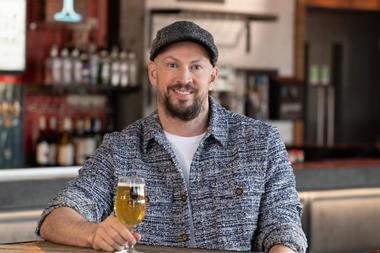
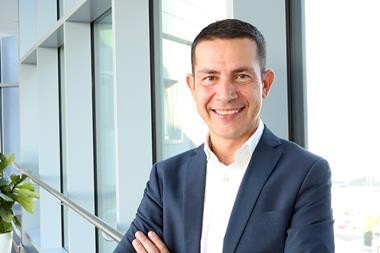
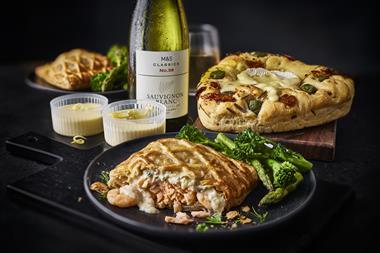




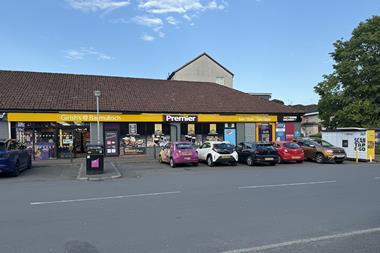
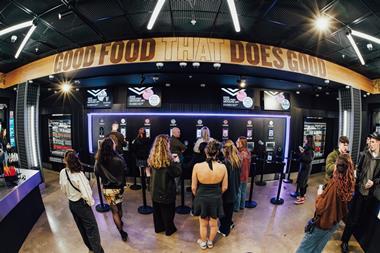

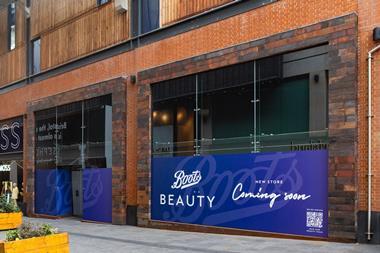
No comments yet